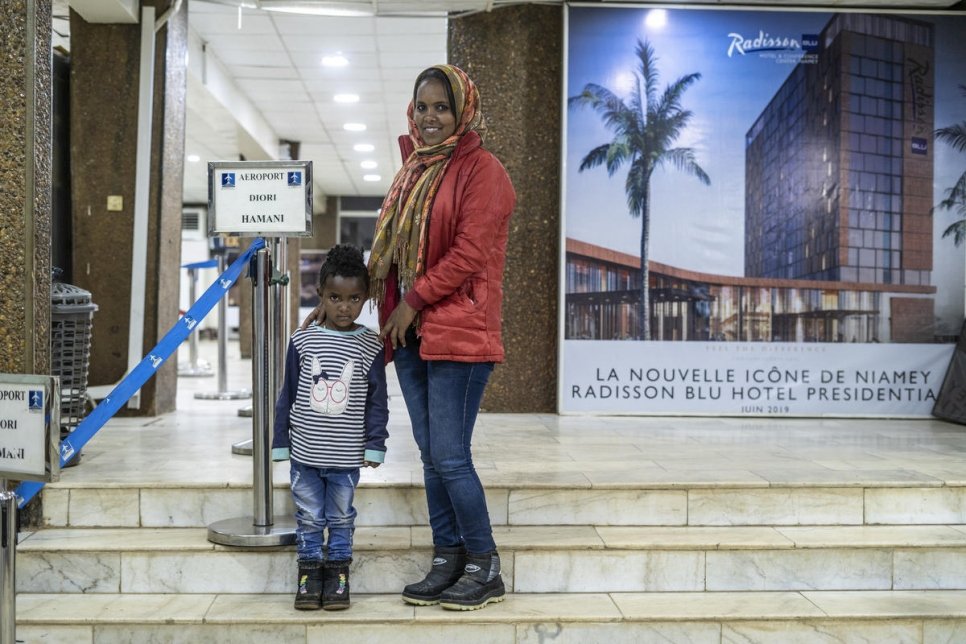UNHCR's life-saving flights from Libya resume after seven-month suspension
This is a summary of what was said by UNHCR spokesperson Andrej Mahecic – to whom quoted text may be attributed – at today's press briefing at the Palais des Nations in Geneva.

A refugee family arrive at Diori Hamani International Airport in Niamey, Niger, following a UNHCR evacuation flight from Libya in April 2019. © UNHCR/Juan Haro
UNHCR, the UN Refugee Agency evacuated last night a group of 153 vulnerable refugees and asylum-seekers out of Libya to the Emergency Transit Mechanism (ETM) in Niger.
This UNHCR-chartered flight marks the resumption of life-saving evacuations from Libya, ending a seven-month long suspension. Humanitarian flights had to be halted in March, due to public health concerns related to the Coronavirus pandemic, which led to the suspension of air traffic in many countries.
Those evacuated yesterday are nationals of Eritrea, Somalia, Sudan, and South Sudan, including 16 families and 15 children under the age of 18, many of whom are unaccompanied or separated from their parents.
With COVID-19 cases continuing to rise in Libya, and some 46,000 confirmed cases across the country, all passengers tested negative prior to departure. They were also given counselling and awareness sessions on how to stay protected and healthy. The group is now undergoing a two-week quarantine in Niger and a further test, in line with health measures to curb the spread of Coronavirus.
The majority of evacuees were living in the Libyan capital Tripoli. Virtually all of them (97 per cent) have experienced arbitrary detention in Libya including in Tajoura, Zintan, or Triq al Sikka detention centres. Some of them had been detained for more than two years in extremely dire conditions and were recently released thanks to UNHCR advocacy with the Libyan authorities.
More than 3,400 migrants and asylum-seekers are currently estimated to be held in government run detention centres in Libya, where conditions are dire and many are at risk of serious abuse.
The resumption of evacuation flights is especially important now, given the volatile situation in Libya, the rapid spread of Coronavirus and its health and socio-economic impact on refugees and asylum seekers, who have found it increasingly difficult to support themselves and their families.
UNHCR welcomes the support the Libyan authorities have shown in facilitating the procedures that led to this long-awaited evacuation flight as well as the release of others from detention centres.
Yesterday’s flight is evidence that despite the threat of COVID-19, evacuations from Libya are possible with joint efforts, shared expertise and medical protocols in place guaranteeing safe transfers.
In Niger, the evacuated refugees are now receiving humanitarian assistance at the Emergency Transit Mechanism, including shelter, food, medical care and daily courses and activities while efforts to find solutions, such as resettlement, continue.
The ETM in Niger has been operational since 2017. Thanks to the support of the Nigerien authorities, UNHCR has been able to evacuate from Libya to Niger 3,165 vulnerable asylum-seekers over the past three years.
In 2020, with this second evacuation, UNHCR has assisted 501 vulnerable refugees out of Libya, including 221 who have been resettled to Europe.
UNHCR continues to advocate with governments to provide more resettlement places and other durable solutions enabling more vulnerable refugees and asylum seekers to leave Libya.
UNHCR also reiterates its call to the Libyan authorities to release all asylum-seekers held in detention and for an end to arbitrary detention.
UNHCR has registered 45,661 refugees and asylum-seekers in Libya.
For more information on this topic, please contact:
- In Tunis, Caroline Gluck, [email protected], +216 299 255 560
- In Tunis, Tarik Argaz [email protected], +216 299 61295
- In Niamey, Jean-Sébastien Josset, [email protected], +227 907 669 77
- In Geneva, Andrej Mahecic, [email protected], +41 79 642 9709
- In New York, Kathryn Mahoney, [email protected], +1 347 443 7646
